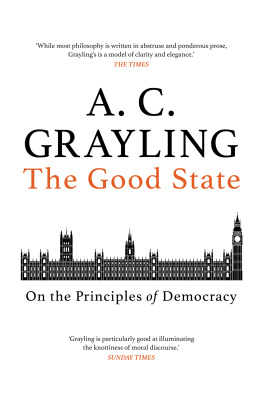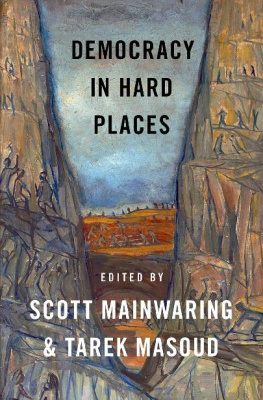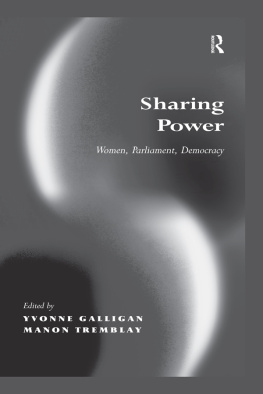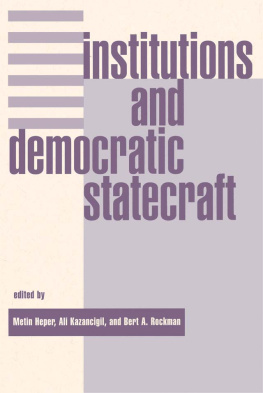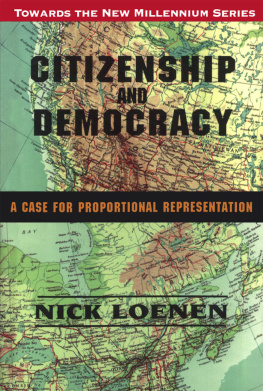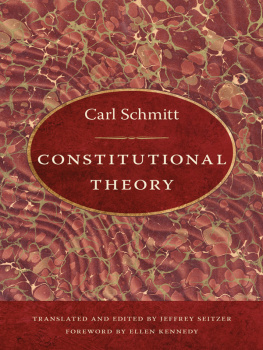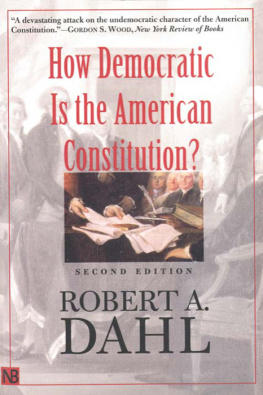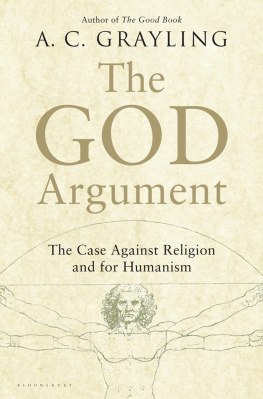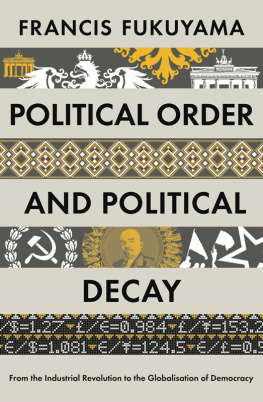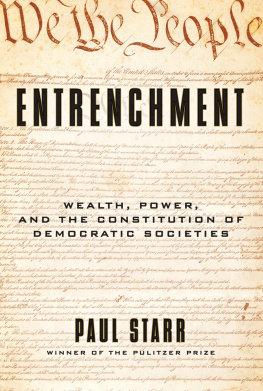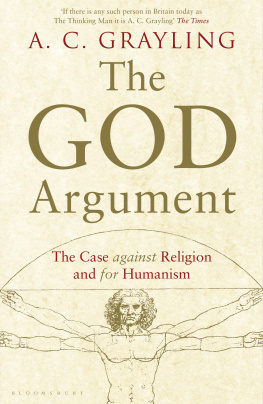Other books by the same author
ACADEMIC
An Introduction to Philosophical Logic
The Refutation of Scepticism
Berkeley: The Central Arguments
Wittgenstein
Russell
Philosophy 1: A Guide through the Subject (editor)
Philosophy 2: Further through the Subject (editor)
The Continuum Encyclopedia of British Philosophy (editor)
Truth, Meaning and Realism
Scepticism and the Possibility of Knowledge
The History of Philosophy
GENERAL
The Long March to the Fourth of June (with Xu You Yu, as Li Xiao Jun)
China: A Literary Companion (with Susan Whitfield)
The Future of Moral Values
The Quarrel of the Age: The Life and Times of William Hazlitt
Herrick: Lyrics of Love and Desire (editor)
What Is Good?
Descartes: The Life and Times of a Genius
Among the Dead Cities
Against All Gods
Towards the Light
The Choice of Hercules
Ideas that Matter
To Set Prometheus Free
Liberty in the Age of Terror
The Good Book
The God Argument
A Handbook of Humanism (editor, with Andrew Copson)
Friendship
The Age of Genius
War
Democracy and Its Crisis
ESSAY COLLECTIONS
The Meaning of Things
The Reason of Things
The Mystery of Things
The Heart of Things
The Form of Things
Thinking of Answers
The Challenge of Things
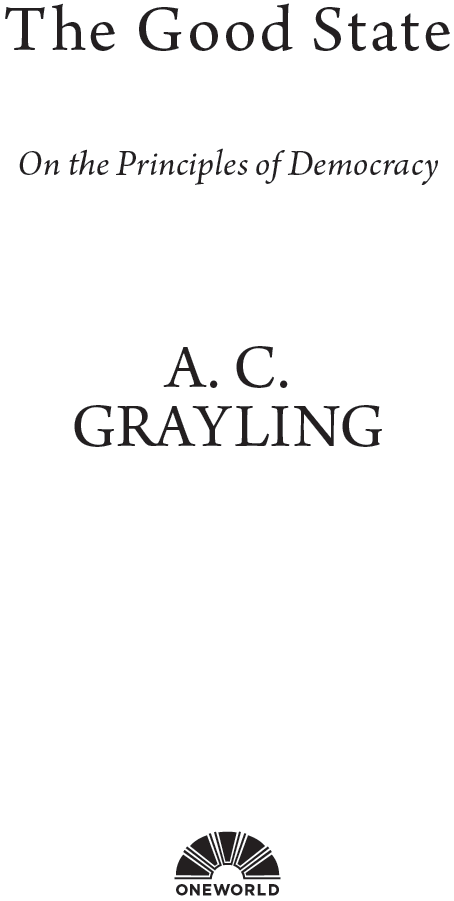
For Eva
No s qu opinar usted, pero a m me parece que un pas civilizado es aquel en que uno no tiene necesidad de perder el tiempo con la poltica.
Javier Cercas, Soldados de Salamina
Contents
Preface
What principles must a political and constitutional order be based upon if it is to be democratic? The following pages answer this question. The answer is given by an examination of what the concept of democracy itself entails. The point of asking the question is that even those states standardly described as the worlds leading democracies do not meet the requirements that the principles of democracy impose.
This is a large claim, but if right it is too important to ignore. In a previous book, Democracy and Its Crisis (2017), I discussed the problems that democracy is facing, especially in what are taken to be two key exemplars of the model: the United States and the United Kingdom. That book outlines what a representative democracy is meant to be, how and why the conception of such a democracy arose, and how and why it has lately gone astray.
The present book is a contribution to this latter task. I undertake it by seeking to make clear the fundamental principles on which a political and constitutional order must be based in order to be democratic in the full meaning of this term. The task is an urgent one, because many more democracies than just the two mentioned are at risk from the absence or decay of the fundamental principles at issue, an absence or decay that developments over the last few years have exposed. We have learned from these developments that there is a ticking time-bomb at the heart of a major form of representative democracy the Westminster Model and its derivatives and developments (of which the US Constitution is a variant) in more than fifty countries around the world. The problem is as large and as widespread as it is serious.
This is not a book about constitutional technicalities, although the points I make are illuminated by reference to aspects both of Westminster Model constitutions and those of other democracies. Instead this is a book about principles , the principles that should underlie a democratic order. It is an answer to the question, What should a democratic order be like in its fundamentals, to ensure that it delivers what democracy is meant to be for? Nevertheless, certain of the fundamental principles directly speak to the question of what a constitution must contain, constraining what any individual constitution for a democratic order can be like. These principles are violated by the very nature of the Westminster Model, so even in countries which have developed and improved that model in a number of respects compare the Australian constitutional arrangements to the British, for such an example they have not defused the time-bomb at the models heart. So I repeat: the problem addressed here is as large and widespread as it is serious.
But this discussion of principles is not intended to be abstract and theoretical merely. Theorizing may have its pleasures, but its terminus is too often the ever-receding utopian horizon which, for the serious business of government and its impact on human realities, is not the right destination. Practical remedies are needed to make democracy deliver its promise of being by the people, for the people . These remedies have to be formulated in response to identified and diagnosed weaknesses in the democratic systems that have evolved over the last two centuries, this evolution having mainly been controlled by those in positions of influence so that they could reduce the extent to which their own power was attenuated. Frustration with the imposed filters that thus increasingly dilute people power the further up the hierarchies of governmental and legislative institutions one goes, prompts some to clutch at radical and dramatic alternatives. This is to risk throwing the baby out with the bathwater, because much in the hard-won democratic advances made over the last two centuries is worth preserving. The better metaphor here is that of a journey, and to say that it has not yet reached its goal, which is: a reliable, well-functioning order that meets the fundamental democratic demand that government, constituted by the authority of the people and answerable to them, exists to serve the peoples interests all the people. There is very much more to this simple and obvious-seeming formula than at first meets the eye, as the following pages are designed to show.
Acknowledgements
I have benefitted greatly from conversations with Lord Lisvane, former Clerk to the House of Commons, whose knowledge on constitutional and parliamentary matters is second to none, and Sir Geoffrey Palmer, former Prime Minister of New Zealand, who has been at work on proposals for constitutional reform in his home country for a number of years. Neither is responsible for any of the views expressed in these pages. In the course of having the interesting privilege of chairing the Where Next group on Brexit 20172019, I had occasion to learn from the views of a number of parliamentarians, among them Dominic Grieve MP, Caroline Lucas MP, Chuka Umunna MP, Tom Brake MP, Phillip Lee MP, Lord Kerr of Kinlochard, Lord Dykes of Harrow, Lord Newby, Lord Adonis, Baroness Wheatcroft, Baroness Ludford, Richard Corbett MEP, Catherine Bearder MEP, Edward McMillan-Scott former MEP these in person, and many others in correspondence. Also, from Peter Kellner and Timothy Garton-Ash both in conversation and in reading their work; from Vernon Bogdanors writings and earlier conversations at the New College of the Humanities; and from numerous others of whom considerations of space prevent mention. To all of these I am grateful. None of them has any responsibility for the views in what follows, and indeed many of them would vigorously disagree with at least some of those views. I am, however, confident that all those named here would agree that the issues raised are important, and need addressing all the more so because of the constitutional difficulties attending the Brexit process in the UK, the analogous implications of the Trump presidency in the United States, and the significance of both for representative democracy in general and Westminster Model versions in particular.

